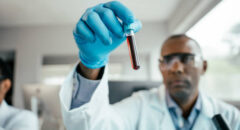 (BlackDoctor.org) — A healthy diet won’t prevent or cure HIV, but it can keep you healthier while you live with HIV and are taking drugs to treat it.
(BlackDoctor.org) — A healthy diet won’t prevent or cure HIV, but it can keep you healthier while you live with HIV and are taking drugs to treat it.
Good nutrition can:
- Keep you healthier despite HIV infection
- Slow your progress towards AIDS
- Prevent health problems related to poor nutrition
- Help you maintain a healthy body weight
As soon as you’re diagnosed with HIV, it’s a good idea to review your diet to see if you are eating as healthily as possible. This is because HIV and HIV treatment can both cause loss of appetite and diarrhea that leads to weight loss and malnutrition over time. Additionally, you may find that stress and depression associated with HIV causes you to lose interest in food.
A Healthy Diet for People With HIV
Here is a basic outline for eating well. Though it can apply to anyone, it’s especially important for those trying to boost their immunity:
- Eat a starch at every meal. Foods like cereals, potatoes, rice, and bread are starches. Try to include whole instead of refined grains.
- Incorporate legumes (nuts, beans, peas) in your diet as regularly as possible. These provide a rich source of nutrients.
- Be sure to eat enough dairy and meat to get the calcium and protein your body needs.
- Eat a rainbow of different colored fruits and vegetables each day. This will maximize your intake of a variety of natural vitamins and minerals. Boil, steam, or stir fry these foods to preserve their vitamin and mineral content.
- Drink lots of water.
- Include small amounts of fats and sweets in your daily diet (but cut out the fried foods and sodas!).
- Take a multivitamin; look for one that contains B12 and zinc.
When You Are Losing Weight
If you’re starting to lose weight or your appetite, you may have to change your diet somewhat to amp up the nutrients and calories you’re consuming. Although this can be challenging if you feel nauseated or have mouth sores or dry mouth, the following dietary changes can help:
- Include more meat in your diet, especially those that are easy to digest, such as chicken or fish.
- Snack more often between meals. Some examples of good snacks are peanut butter sandwiches, yogurt, and fruits.
- Add more healthy fats — such as avocados, olive oil, nuts, and nut butters to your diet.
- Use whole dairy products instead of skim.
- Drink liquids in between meals instead of with meals.
If you lose 13 to 15 pounds without trying or you often feel too sick to eat, it’s time to call your doctor to discuss medications or other techniques that will make it easier to get food down.
Your doctor can determine whether your loss of appetite is HIV-related, a side effect of your HIV treatments, or a symptom of depression. Treatment will vary according to the cause.
You should also try to get regular moderate exercise, which can help stimulate your appetite and provide many other health benefits. One good reason to exercise, for instance, is that it reduces stress and depression, both of which can lead to a reduction in appetite.
Infection and Nutrition
Weight loss often occurs as a result of an opportunistic infection (an infection that usually only affects those with a depressed immune system). Preventing infections and getting treated for infections early will help you maintain your weight and your appetite.
One common source of infection is contaminated food — so make sure you practice food safety in your kitchen by:
- Cooking meat and eggs thoroughly
- Not using the same cutting boards or knives for both vegetables and raw meat
- Washing your hands often, especially after handling raw meat, raw eggs, or unwashed vegetables or fruits
- Washing fruits and vegetables thoroughly before eating
- Not keeping leftovers for more than two days and always reheating them at high heat
If you’re not sure how to make your diet healthier, talk to a nutrition counselor. Nutrition education has been shown to help people with HIV eat a healthier diet. This is especially important if you have HIV and are also pregnant.









